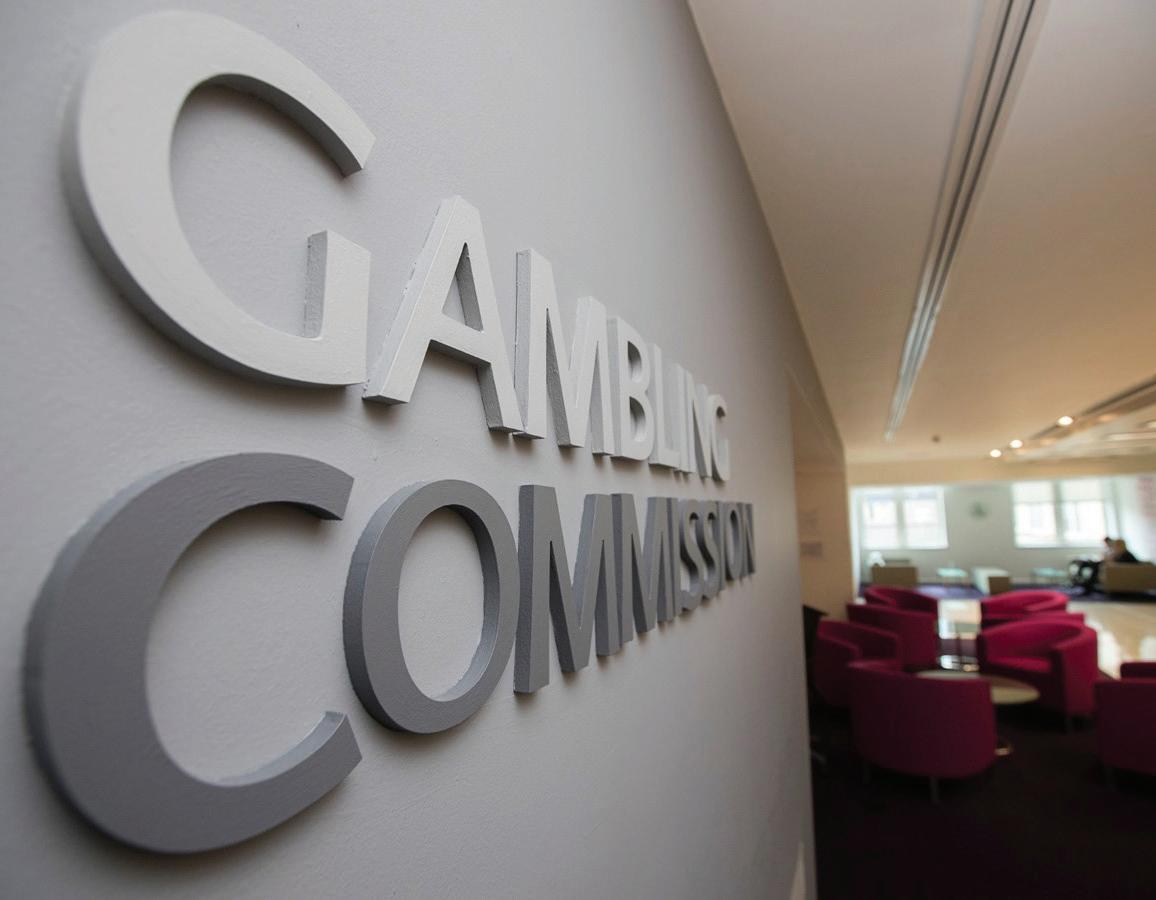
8 minute read
CHRSTINA THAKOR-RANKIN
Another year over, and what have we done? Quite a bit as it happens.
By Christina Thakor-Rankin
Rising out of the ashes of lockdown and making up for lost time, it’s difficult to remember a time where there was as much high-level, high impact activity amongst regulators or operators in a single 12-month period as there has been this past year.
From a regulatory perspective this year is the year that has seen three of the most anticipated markets finally open up properly to regulated online gambling: Germany, the Netherlands and the US. This is huge.
In Europe, after years, decades even of political back and forth and a few false and failed starts two of Europe’s most eagerly anticipated remote gambling markets finally got themselves over the finishing line and opened their doors to a newera of regulated online gambling. Taking an early steer from their regulatory counterparts in other parts of Europe, however, both have set out relatively high entry requirements and an even higher stance on social responsibility - ensuring that neither is the easy walk-in or over that, operators had been hoping for.
In the case of Germany, regulation comes with some of the strictest product and player protection requirements anywhere in Europe,almost immediately pitting thefledgling regulated marketup against the previously grey,and now black, market. Add to this the relatively high cost of entry, high taxation, and the knowledge that the current regulatory framework will

be replaced by the establishment of thenew national gambling regulator, the Glücksspielbehördedue to take charge in 2023, and any operator considering Germany needs to have relatively deep pockets, a seriously smart CRM team and an ability to adapt quickly to future regulatory shifts.
The Netherlands appears to be more welcoming, but only to those who play by the rules. No stranger to taking action against transgressors even before the marketopened - Entain(€5million)and Betfair (€12million) two of the more notable ones - those blotted copy books and historical activity are now a key consideration in an already very stringent license application process. As a result. out of the 29 applicants in the first tranche only 11 managed to secure a licence. With the next set of licenses due to be issued only in April 2022, and that following a period of intense monitoring and scrutiny of the first 11, it may be some time before some of the big players can get a foot in the door.
There have also been positive moves and murmurings in other markets very popular markets such as Ireland, New Zealand and Canada and which over time have become various shades of grey and the hunting ground for the .com operators willing to consider creative approach to acquisition and payments.
Then there is the gorilla in the room - the US. With state after state announcing either a new sports-betting bill (Ohio being the latest to jump on the bandwagon) or the revenues earned from activation of said sportsbetting bill, mega brands like MGM and Disney muscling in, and the NFL throwing their weight behind the NCPG it is surely only a matter of time before the conversation shifts from state to federal - and pushes up the stakes even further. More about this later….
Staying with regulators for the moment, in a year which has seen a record number of new markets (state or national) emerging, one might be forgiven for thinking that 2021 was all about the new. Not so. Those overseeing established marketshave been just as busy focusing on monitoring and enforcement - and this has proved not so good news for operators.This year,2021, has seen regulators in Australia, the Netherlands, Sweden, UK and the US between them levy financial penalties totalling


a staggering £40 million. This is a little less than the £44 million last year, but a massive increase on the £20 million in 2018 and £17 million in 2017. There is undoubtedly more to come from the Netherlands and Sweden, Ireland has already indicated that it’s new regulator will have the power to issue fines up to €20 million, and the US regulators haven’t even got started yet. You know something is ‘a thing ‘and here for the duration when it gets its own dedicated website: https://gamblingindustryfines.com/. 2021 is merely a precursor for things to come.
The jurisdiction leading the enforcement charge, and general raising of standards is the Gambling Commission of Great Britain. If recent events are a sign of things to come, then it seems that UK is about to kick-start a new trend. Taking a steer from Germany where the new regulations cap a player’s monthly deposit not on a per operator basis but across all operators, the Gambling Commission has been making noises about a single customer view for a while now. Some have dismissed this as fancifuland never going to happen. More fool them, have they learnt nothing from the last few years? The keynote address by the Commission’s CEO Andrew Rhodes, at the recent Gambleaware conference made it clear this is going to happen. In the case of the UK however it goes way beyond just deposits. Depending on the scope of the project and who and how it is approached, SCV could include financial and game play activity, RG history,and actions and interactions undertaken by operators. This would provide the ultimate player profile and force a shift the balance from operator managed customer to industry managed customer, shrinking the market and pushing it naturally towards consolidation - and which brings us nicely back to newly regulated markets.
2021 has been dominated by a slew of mergers and acquisition have dominated 2021. These are not the David and Goliath, big fish swallowing smaller fish battles of old. These are full on Godzilla versus King Kong battles, driven by the US sports-betting and online gambling gold rush. So far we have seen William Hill being divvied up between Caesars and 888; Bally’s acquiring Gamesys: Scientific Games sell OpenBet and buy Authentic Gaming, swapping sportsbook for live dealer; and Entain being the subject of a now abandoned takeover bid by Draftkings,but surely only a matter of time before a new suitor emerges.
These pale into lesser significance compared to what is promising to be the mother of all takeover battles –Playtech. Historically one of the most acquisitive operators in the sector, Playtech now finds itself at the centre of a four-way bidding war between Aristocrat, Gopher, JKO Group and Ms Lo, the Vitasoy heiress, who hasbeen quietly built up her shareholding in Playtech to 5% - and all of destined to push the company’s sale price up beyond the $3billion mark. All because of the US. With this in mind, and with the likes of MGM, Disney, Jay-zee and others jumping on the bandwagon what prize Entain or even Flutter’s next suitor is an Amazon or Warner Bros or Universal?
And what of the impact on the industry as a whole. The impact of big US firms on the rest of the world is already evident in the food and beverage, hospitality and entertainment industry. To date gambling’s only truly global operator has been bet365 but the US looks set to change all of that. How and whether for the better or worse is too early to say. What we can say is that 2022 promises to be just as impactful as 2021.
In the meantime, and on a lighter and more topical notehere’s a little seasonal something for all the racing fans out there: https://www.facebook. com/watch/?v=639753507384585

Florida Sports Betting App To Repay All Bets

Following the legal wrangling over sports betting in Florida and the decision that the Seminole Tribe are not legally allowed to offer sports betting outside their tribal lands, the question has now been brought up on if the Tribe will have to repay all those bets it has taken prior to the ruling.
At one stage it was thought the Seminole Tribe of Florida was going to buck the order to close its sports betting business in the state but the U.S. Court of Appeals for the District of Columbia Circuit ruling last Friday upheld the previous lower courts decision for the tribe to shutdown the sports betting app while they appeal the original ruling, and so the tribe has now shut down all sports betting activity on their Hard Rock Sportsbook app.
But now the ruling on the compact to allow the Tribe to run sports betting has now been found to be void, although it will be legally challenged the fact is at present the court ruling says that sports betting was not allowed. Blackstone the private equity firm that is currently discussing a takeover of Australian casino operator Crown Resorts for $6.2 billion has announced it is to offer a public listing to another of its businesses.
According to reports in Spain the giant equity firm has hired investment bank Lazard to look at listing Spanish gambling company Cirsa, which has betting shops and casinos in the country and in South America.
Back in 2018 Blackstone acquired the gambling company for €2 billion. Cirsa was founded back in 1978 by Manuel Lao Hernández who is one of the richest people in Spain.
The gambling company has 147 casinos, 178 gaming halls, 70 bingo halls, 2,000 betting shops and 75,000 gaming machines spread across Spain, Italy and Central and South America.
It is not certain that the IPO will go ahead but if it does would mark a sizeable profit for the equity company as it is expected to raise up to €3 billion.
Blackstone Considers €3 billion IPO For Cirsa






